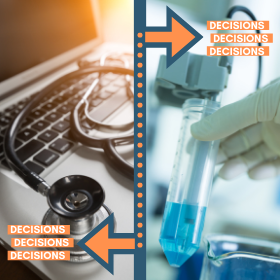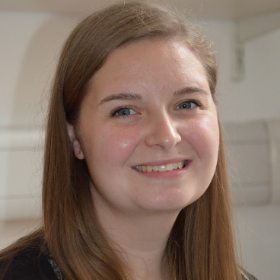When I was younger all I wanted to be was a medical doctor. I ended up being an academic doctor (scientist) instead. Even though I had never imagined being an academic scientist, I am happy and content and believe this is what I am meant to do.
I did well at secondary school and was not used to failing in what I set out to do. My favourite subject was science, in particular the Biology aspect of it. When I got a good grade for my double award Science GCSE, it showed me that as well as having a passion for it, I was good at it. The human body fascinated me so it was only natural that I developed my aspirations to be a medical doctor. I knew I wanted to go to university so I decided that medicine was what I would apply to.
Applying for medicine was also thought of very highly at my school, I imagine as it looks good for their statistics if students go on to study the most competitive degrees that there are. This starts to feed you the belief that medicine has a higher sense of status than other jobs so I automatically thought that I should start aiming for something like that. I was the first in my family to go to university so my parents couldn’t guide me too much. Therefore, I relied on the school for advice on what was out there and how to go about getting to where you want to be.
The school did what they should do, holding career fairs, having previous students come in to talk to us about their jobs. However, these were all the jobs you think of as a child and are common knowledge to the public. I had no idea what a scientist does and what route you would need to take to get there. I wish I would have had access to academic scientists and what they do.
When applying for medicine as an undergraduate, you can only put four medicine options down out of a total of 6 (at least in the UK). I gave much thought to what universities to put down for these options. The other two options, you are encouraged to put down a backup course as medicine is so competitive to get into. I chose to put down Biomedical Science as it was the closest thing to medicine I could see. As I was used to succeeding, I was not expecting to use these choices and did not give much thought to where I should go to study them.
The applications went in and I nervously awaited my results. To my disappointment, rejection after rejection came in for the medical places.
I did receive two conditional offers to study Biomedical science though. To say I was devastated is an understatement! I thought I had failed and really started to panic. I had to look back at the offers for Biomedical Science that I did have. I looked at the places I could go to and realised I didn’t even want to study there. When results day came, I used UCAS extra to find an alternative space to study Biomedical Science at the University of Southampton. In hindsight, this was the best decision I made.
 Whilst doing my undergraduate degree, I enjoyed the course but always had in the back of my mind that I was just doing it to get into postgraduate medicine after uni and at the end of the 2nd year I did apply again. During my third year though, we had a third year dissertation project to do and I chose to do this in the laboratory undertaking real scientific research. Whilst I waited for my application decisions to come in, I delved in to my project and discovered that I really enjoyed this type of work. It opened up my eyes to another possibility and I began to not worry about what the decisions for my applications would be. By the end of my project, I had decided that I needed to explore scientific research further. After my BSc, I got a role as a research technician to build my skills and confirm to myself this was the path that I wanted to go down and then successfully completed a PhD in neuroscience researching dementia.
Whilst doing my undergraduate degree, I enjoyed the course but always had in the back of my mind that I was just doing it to get into postgraduate medicine after uni and at the end of the 2nd year I did apply again. During my third year though, we had a third year dissertation project to do and I chose to do this in the laboratory undertaking real scientific research. Whilst I waited for my application decisions to come in, I delved in to my project and discovered that I really enjoyed this type of work. It opened up my eyes to another possibility and I began to not worry about what the decisions for my applications would be. By the end of my project, I had decided that I needed to explore scientific research further. After my BSc, I got a role as a research technician to build my skills and confirm to myself this was the path that I wanted to go down and then successfully completed a PhD in neuroscience researching dementia.
The definition of science is ‘the intellectual and practical activity encompassing the systematic study of the structure and behaviour of the physical and natural world through observation and experiment’. Science is the make up of everything on earth and without it, none of the medicine that exists today would be available. Scientific research delves into the bigger questions why and understands the complexities and problems of each disease or function in much greater detail. I like to think of it that by studying medicine you help people directly and can find a solution to short term problems whereas with scientific research you can help many more people indirectly by contributing to new discoveries and build up to the treatments that can be used in medicine.
Medicine is still the right path for some people and there is nothing to say you can’t be a researcher once you have a medical degree. Many people also go on to study medicine after completing a PhD. The two worlds overlap greatly. There is no linear path, you should just follow what you feel is right at the time. However, I do believe that if I had known more about a research career when I was choosing what I wanted to do, I might have been happier with my decisions along the way. Scientific research suits me. I like the flexibility of the working hours I do, I like how varied the job is with doing something different every day, I like the fact we can work as teams to find solutions to problems and how I then get to incorporate teaching and public engagement into what I do.
My final advice to anybody trying to choose what to go into is to do as much research as you can into the different options available to you. National Careers Week is a great opportunity to do this. Don’t dismiss something because you haven’t heard much about it. Instead, find out more. If you don’t get to do your first choice, don’t be disappointed. Just know that you are on your own path and in the end you will get to where you need to be.
Author

Dr Christina Toomey
Dr Christina Toomey [1] is a Post-doctoral Research Associate at University College London and The Francis Crick Institute. Having worked as a neuroscientist for 10.5 years, she is still as passionate as she started. Christina is an active member of the lab, in addition to teaching undergraduates, MSc and PhD students. She also works on widening participation and public engagement, through UCL and representing Alzheimer’s Research UK. Outside the Lab, Christina is a Brownie Leader, Netball Player and Science Tutor.
Got a question for Christina? Reply in the box below